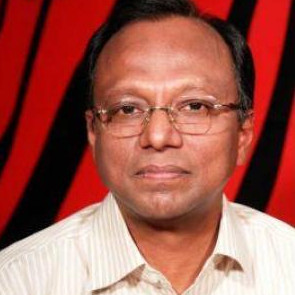
THE MAHMUDUR RAHMAN CONUNDRUM
Anyone with a shred of decency would find the attack on Mahmudur Rahman difficult to defend. According to media reports, the perpetrators belong to the ruling party student wing, Chhatra League. Clearly, he was targeted simply because the former acting editor of Amar Desh newspaper is an outspoken opposition firebrand.
At the time of the attack, Mahmudur Rahman was about to leave the Kushtia district court premise, having obtained bail in a defamation case filed against him for allegedly making “derogatory” remarks about Sheikh Mujibur Rahman, Bangladesh’s founding father, and Sheikh Hasina, the prime minister (also Sheikh Mujib’s daughter).
The aforesaid case is most likely baseless, politically motivated and intended to harass him, as these defamation cases typically are. Even if the remarks Mahmudur Rahman allegedly made about Sheikh Mujibur Rahman and Sheikh Hasina were sufficiently “derogatory,” my view is that compensation claims—let alone criminal prosecution—do not apply in this case.

As soon as the news broke, I wrote a two-liner on Facebook. “While I staunchly differ with Mahmudur Rahman on nearly every issue,” I noted, “I condemn the attack on him. This is a pathetic new low.” However, the post did not go well with some of my friends, who contended that the “disclaimer” weakened my statement.
But should we be unequivocal in our condemnation in such a situation without providing clarification?
Why I oppose Mahmudur Rahman
Before dwelling into the complex question, I should explain why I share serious disagreements with the individual and what he preaches, and why I find him a very problematic character.
Using liberalism when it suits him
Too often Mahmudur Rahman calls this government an undemocratic and fascist regime, but he is not particularly an anti-fascist or pro-democracy figure as his supporters would have me believe. In fact, he rose to prominence (or notoriety) by filing a defamation case against a prominent think-tank when he was a top adviser to the then BNP government.
During his stint as the editor of Amar Desh, he called for arresting a number of fellow journalists. Ironically enough, Golam Mortoza, one of the journalists he wanted to see imprisoned, condemned the attack on him. I doubt if Mahmudur Rahman could ever forgo ideological differences and stand in solidarity with other fellow journalists in jeopardy irrespective of their political leaning.
When Islamism outweighs democracy
Judging from his frequent evocation of political-religious rhetoric, one can safely assume that he is an ardent supporter of political Islam. He, perhaps, believes that there should be a formidable Islamist force—be it Jamaat-e-Islami or Hefazat-e-Islam (with the latter being the outcome of his arrogance or stupidity)—in Bangladesh’s political climate. That should not be a problem for me, as the right-wing or conservative forces have always had a place within the purview of democracy.
But his opposition to this current regime stems less from his concerns about its “slide towards fascism” than a belief that this regime is “anti-Islam” or “pro-India.” As such, I doubt if he will oppose a fascist regime if it was both Islamist and anti-Indian in his view.
In fact, on the very day he was attacked, he demonstrated a remarkable abhorrence of India. Even though he was targeted by petty thugs of Chhatra League, he managed to find a way to blame it on the neighboring big brother. Labeling the perpetrators as “dogs of Delhi,” he was heard as saying, “I will die for Islam….Will peel off Hindus.” (Some of his supporters dispute the second part of the quote exposed by a video published by Prothom Alo)
Those who associate with me know very well that I am not an admirer of Indian policies towards Bangladesh—in fact, far from it. But Mahmudur Rahman’s obsessive anti-India rhetoric, coupled with the frequent evocation of Islamic terms when he talks about India, is suggestive of deep animosity for a nation, shaped by religious prejudices. I cannot help but compare this behavior with the type of antisemitism which disguises hatred for the Jewish people in the form of the criticism of Israel.
(Note: I am a strong critic of Israeli policies towards Palestinians and a supporter of BDS movement against the Israeli government, but I concurrently believe that dangerous antisemitic prejudices exist in our world in many shapes and forms.)
A dangerously irresponsible ‘editor’
The irresponsibility Mahmudur Rahman demonstrated while he was the editor of the the-then second highest circulated newspaper, was beyond any sane limits. The supposed “reports” published in Amar Desh during Shahbagh days were not only slanderous and irresponsible but also contained dangerous and blatant provocations and incitement to violence. The way he managed to shape the turbulent events left a permanent scar on the fabric of this country.
—
Therefore, without clarification, my Facebook post in question would provoke unsolicited labeling and could mislead many who did not know me well. But I was not just being practical or transparent when I attached the disclaimer. The post was meant to highlight the notion that we should be dictated by our principle in standing in solidarity with the victims of violence including those we strongly disagree with.
Undoubtedly, Mahmudur Rahman has shown immense guts for what he thought was right. There can be no doubt that he was unfairly and cruelly treated by this government for speaking out against it. But to me, he is a right-wing populist, who exploited the division in our society to advance certain political goals or satisfy his personal ego, and whose ideological position runs counter to the spirit of democracy, and who I am vehemently opposed to.
So, my support for—or opposition to—him is not personal. As such, none of the argument I made above should justify attacks on him. I judge him by his conducts, and I oppose attacks on him—or his arbitrary detention—by my principle, and this conundrum compels me to put a disclaimer when I write about him.